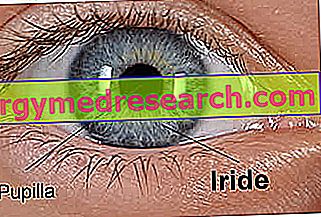Generality
DHA (22: 6 n-3 or docosahexaenoic acid) is a semi-essential fatty acid of the omega three series.
DHA is present in fair quantities in fish, particularly in salmon, mackerel, sardines, herring, tuna and anchovies (blue fish).

Outside of these foods, the food sources of DHA are particularly scarce; we find it in small quantities in the meat, especially if the animal has been fed with fishmeal or linseed (in this case it is also present in the eggs of the oviparous, such as the hen).
As evidence of its essentiality for the human organism, DHA is also present in breast milk, while it is absent in the cow's milk and in its derivatives, as well as in vegetable oils.
From this finding comes the recent practice of integrating the diet of the pregnant woman and the nurse with DHA, in order to guarantee the correct development of brain tissue, visual acuity and the cognitive abilities of the fetus and the newborn.
Many companies specializing in the production of adapted milk add DHA to their products to bring their composition closer to human milk.
Composed of a chain with 22 carbon atoms - along which six double bonds are distributed, of which the first between the third and fourth carbon atom - DHA is one of the most interesting fatty acids of the Omega 3 series due to the possible repercussions clinics.

Indications
Why is DHA used? What is it for?
DHA is an essential fatty acid, known for its marked metabolic activities.
More precisely, DHA is attributed to:
- Lipid-lowering properties, useful in reducing blood concentrations of triglycerides and LDL cholesterol.
- Neuroprotective properties, effective in protecting the central nervous system from the damaging action of reactive oxygen species;
- Antioxidant properties, biologically valuable for various organs and systems, including the reproductive system;
- Anti-inflammatory properties, able to extinguish the phlogistic cascade upstream;
- Immunomodulatory and antiallergic properties.
By virtue of these biological functions, supplementation with DHA has proved useful during hypercholesterolemia, hypertriglyceridemia and increased cardiovascular risk, neurological and neurodegenerative diseases, eczema and allergic pathologies, retinopathies and autoimmune diseases.
The positive effects of DHA on the normal development of the central nervous system of the unborn child are also well characterized.
Property and Effectiveness
What benefit has DHA shown during the studies?
The number of studies related to the biological and clinical efficacy of DHA has grown exponentially in recent years.
This huge amount of literature has made it possible to clarify some molecular aspects that had remained obscure for a long time, and to identify new clinical applications for DHA.
DHA and lipid metabolism
The importance of DHA in the control of dyslipidemia has recently been confirmed by several clinical trials.
The use of 1.25 g of DHA would in fact have proved effective in ensuring, in a few weeks of treatment, a 20% decrease in blood triglyceride concentrations.
This data, combined with the anti-inflammatory and antioxidant action, would underline the cardioprotective utility of DHA.
DHA and fetal development
Although there is still no unanimity regarding pre-natal and neonatal applications, some studies and authors support the usefulness of DHA in promoting the correct development of the central nervous system and the retina of the unborn child.
Further work would associate an improvement in the IQ to the correct intake of DHA in the first few months and years of life.
DHA and neurodegenerative diseases
The first experimental evidences on the neuroprotective utility of DHA have been followed over time by clinical studies worthy of note.
In fact, the correct intake of DHA would seem to reduce the accumulation of inflammatory cytokines, in part involved in the pathogenesis of diseases such as Alzheimer's, thus being able to delay the aggravation of the disease and its consequences on the quality of life.
Neuroprotective activity has also been widely observed on retinal cells and in the course of ophthalmological pathologies, such as age-related macular degeneration
DHA and inflammatory diseases
The ability of DHA to control the production of inflammatory cytokines has facilitated the use of this nutrient in the management of numerous pro-inflammatory pathological conditions.
Cystic fibrosis, rheumatoid arthritis, inflammatory bowel disorders, male fertility disorders and allergic diseases would be some of the main clinical entities that would benefit from adequate integration with DHA.
Doses and method of use
How to use DHA
The most characterized and effective dosage of DHA, due to the positive metabolic repercussions on the lipidemic profile, is that of 1-4 grams daily, despite its biological action is already carried out at doses of 50-200 mg / day.
In order to avoid harmful oxidative processes, DHA-based supplements should also contain antioxidants such as tocopherol and be stored away from sources of light and heat.
In order to improve absorption and tolerability, DHA should be taken with meals.
Side effects
The use of DHA has generally proved to be safe and well tolerated.
Sometimes the appearance of abdominal pain, diarrhea, belching and fishy-fish regurgitation has been recorded (following the intake of DHA extracted from fish liver oil).
Contraindications
When should DHA not be used?
The use of DHA is contraindicated in case of hypersensitivity to the active ingredient or to the food from which it was extracted.
Pharmacological Interactions
Which drugs or foods can change the effect of DHA?
Although no noteworthy drug interactions are not known, it should be considered that the antithrombotic effect of DHA could alter the coagulation profile in patients undergoing antiplatelet or antithrombotic therapy.
Precautions for use
What do you need to know before taking DHA?
The use of DHA during pregnancy, lactation and early life should be supervised by medical personnel.



